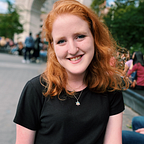Episode 37 — Joey Patt
Introduction: You’re listening to Opening the Tent: Stories of Jewish Belonging, an original podcast produced by the NYU Bronfman Center for Jewish Student Life. Our guest today is Joey Patt, a graduate of NYU and a Podcast Producer at iHeartMedia.
Joey Patt: I am actually half Jewish, and my mom’s Catholic, neither of my parents were super religious, I guess, in the traditional sense that they wanted us to, like have an understanding of, of the cultures that we were coming from, and just sort of like a, I guess, that level of like social literacy, at the very least. And so my parents pretty early on decided that they wanted to raise their kids with both traditions. They both came from pretty, you know, religiously conservative families. They went through a lot of just having their marriage recognized, even and finding sort of like other people that were doing what they were doing a lot of people that my parents knew, either were marrying somebody within their religion, or somebody would convert, or they just like, decided to, like, get like, forego religion altogether. When they were looking for, like churches, and then synagogues to go to, the church in my town was like, super conservative, so they definitely were not going there. And then the synagogue in my town that a lot of my friends went to they were more like progressive, quote unquote, and liberal, but my parents went there and they were like, okay, yeah, no, we’re fine, we love interfaith families, but you have to raise your kid only Jewish. And, you know, my mom was kind of like, okay, no. Then there was this really cool program in Chicago called the Interfaith Family School, where all the families where one parent was Jewish, and one parent was Catholic. You know, as a little kid, I like hated having to get up early on Sundays, and go to these things, and then have to do kind of, like, you know, it’s like fun, you got to do Hanukkah and you got to do Christmas, but also, like, you know, I had do Friday night services sometimes and then do church, like, less than two days later. You know, which as a kid that’s, that was super boring to me. But I think it was interesting that because that it was more for giving people like a, like a kind of sense of both of their cultural backgrounds, like I learned more about, like, the history, and the kind of the impact that Judaism and Catholicism have had, like, in the world and on like the city of Chicago, and the history of kind of, like interfaith activism and stuff like that. And, you know, I think ultimately, I kind of walked away, leaning more towards the Jewish side, but you know, I appreciate having that education. And if you look at like my family, like my sister, my sister, still identifies as like culturally Jewish, but she’s definitely leaned more into like the Catholic side in terms of like, faith. And I think that’s super interesting that like, you could have all these different kind of experiences locking away from that. I’ll look at my memories of both sides of my families, though, and I think I was always, you know, I’m the oldest. So I was the first one that had to deal with this, but I think I was always either like, the Jewish kid or the not Jewish kid. There were other Jewish kids in my school, but they all pretty much went to the same temple. They all kind of like knew each other and would like go to Sunday school together, kids are kids, they’ll just repeat what they hear. So I had other seven year old tell me like, oh, you’re not really Jewish, cuz your mom’s not Jewish, which was weird. I think I think I definitely developed a kind of like, imposter syndrome in a weird way. From when I was a kid that I don’t think I really fully got over until college. Going into college, actually, the first other Jewish student that I met, we were talking and he had mentioned something about, like, going to a Bronfman service. And I was like, yeah, like, that’s cool, but like, I don’t know, like, I’m only half Jewish, so I just, like, don’t really feel like they would accept me or whatever. And he was like, oh, no, I’m half Jewish, too. And I was like, what? Like, I was like, oh my God, like, it’s not just me? You might think it’s interesting, because I feel like looking back, I definitely like it’s not that I like have reasons not to be, like Jewish, or I have reasons to want to walk away from Judaism and being Jewish, but like, you know, I think there was a lot of pushback that I had to face earlier on in my life. You know, I very easily could have just like, had this be an aspect of my identity that was like, oh, yeah, I’ll do Hanukkah and Passover sometimes, and you know, my dad and I will watch Coen Brothers movies together. But like, I think it definitely says something that there was something about Judaism that even like early on as like a teenager I was really drawn to, even in kind of like, harder moments of my life. I’m still not a super religious person, but that commitment to try to make the world a better place and knowing that I have that inside of me. That has really kept me going.
Outro: Thanks for listening. This episode is produced by the b|hive story collective at the NYU Bronfman Center. Subscribe on Spotify or Apple podcasts for new episodes every Monday.
